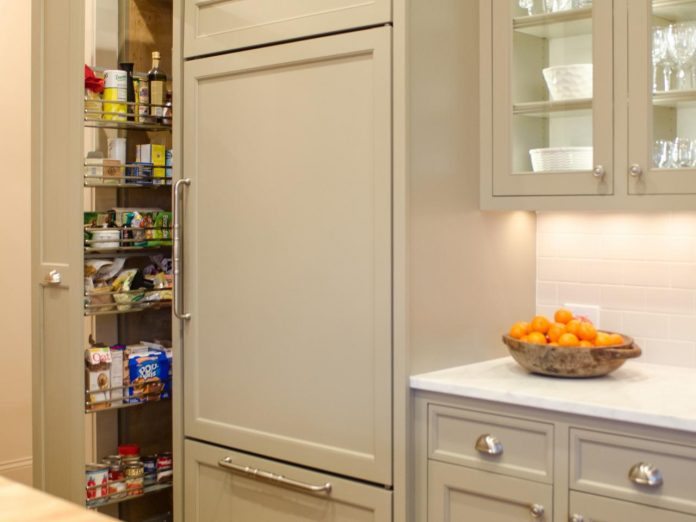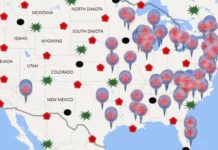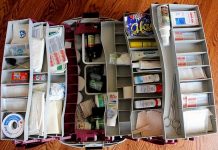For when SHTF, we all have our food storage. Without outside interference, some of us can survive on our supply for years. What happens, though, when our supply is threatened by an outside interruption? Hungry neighbors can try to force their way in to steal your surplus food in a desperate scenario.
We, as preppers, are ready for anything. It is nice for storage to have a dedicated space in your basement or root cellar, but it can have easy access to intruders. You would have to start building your surplus from the ground up, again, if a burglar discovers all your food in one place. If people have already resorted to stealing food in this case, that is an expensive hassle.
Instead of having all of your long-term non-perishables in one place, I personally prefer to spread out my food in various hiding locations. I keep a thorough list of my hiding places and what is stored there, in order not to lose track of my inventory. It is also beneficial to have expiration dates clearly marked on the list as well. Keep this list easily available but secured, such as on your tablet or computer, or inside a safe with a physical list.
Not to state the obvious, but when storing, please bear in mind obvious fire hazards. In addition to electrical wires, etc., cardboard or wood boxes of food would not fit well. They should be 100 percent critter-free whether your hiding spots are under floorboards or behind walls. Just make sure that you search your hiding places long before you store them.
Here are some of my favorite unspeakable secret places for non-perishable food.
A Hidden Room
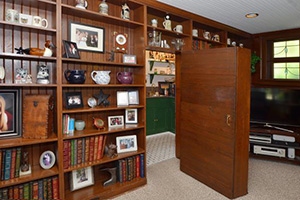

Like me, maybe you know your way around a project at home. If the space is completely shielded, home invaders will never be able to locate a cache, and most homes do not come with secret rooms upon purchase (unless you’re lucky).
Tons of homes have “dead space” between the walls, leaving a few rows of vacant square footage here and there. It is possible to excavate, reframe, and add shelves to these rooms. A bookshelf or cabinet will mask the entry to your new secret food storage to conceal the space entirely.
Emergency Shelter
You may already have an underground storm shelter if you are living in a tornado area. In these areas, surplus food can easily be stored. Since they are underground, the humidity levels for food storage should be sufficient.
It should be stored under benches or on shelves. It is also a smart idea in your climate to have sustenance during increasingly dangerous conditions.
Related: 59 Long-Term Survival Foods and Supplies from the Grocery Store
Under Stairwells


There’s always a lot of empty space beneath your basement’s stairwell, or from the first floor to the second floor.
This is a great opportunity to store food, as this room is normally dry and regulated by temperature. At the very back of the stairwell, I like to store food and store household furniture and other stuff to hide the food behind it.
Survival Caches
You can dig some proper storage caches all over your property in the case of SHTF. Moisture, critters, elements, and temperature are immune to all cache containers. Remembering where you buried them is the hardest part!
Closets
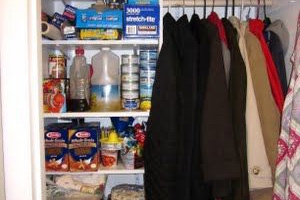

Sure, it might be obvious to store food in a closet. But it’s the place you need to pay attention to inside the closet.
In your coat closet, boxes of non-perishables can be kept under hanging coats. On top of most closets, the high shelves often go unused, making them the ideal place to store lighter items, such as lighter bags or vacuum-sealed foods.
Related: Sealed Foods that Last Forever
Rental Storage Unit
Just in case your home is destroyed or stolen, you can never store all of your food in one location at home. If your house is under pressure, getting some food surplus in a storage unit is a smart idea.
Rentals that are temperature regulated and reputable can be found. Some are even elevated in the off-chance the unit has a critter or two. The unit should also be well-shaded and facing away from direct sunlight.
Bug Out Location
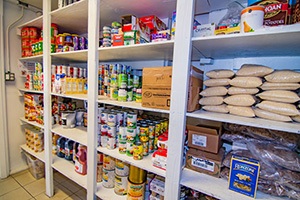

If you are lucky enough to have a place to which your family retreats in a global emergency, make sure that you have a non-perishable rotation hidden in that location. This way, packing food is one less thing on their mind if family members have to run.
It is helpful to share this room with trusted family members and friends if anyone is in trouble. Both participants can consent to continue to add to the stock as they take it.
Galvanized Steel Garbage Cans
These garbage cans store some items very well, such as dried beans or grains. They can be stored in a garage, basement, or barn and will retain optimum temperature and moisture. This is also a perfect place to store extra pet food if you are a pet owner. Using brand new bins, with food containing oxygen absorbers in mylar packets.
Related: How To Repackage Foods in Mylar Bags With Oxygen Absorbers For Long Term Survival
In The Ground
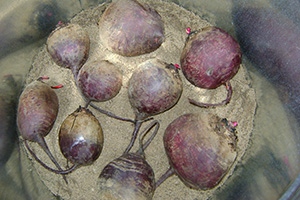

How do you store food in a garden of your own? In cold weather regions, root vegetables can be stored immediately in the soil after harvest during the winter months.
Vegetables that can be stored in this way range from beets, to potatoes, to carrots. To ensure the veggies are free from rot or critters, check regularly.
Chamber
A perfect place to hide food is the guest bedroom/home office. N on-perishables can go inside a desk or be stacked inside the closet. Without being in plain sight, storage shelves may also conceal additional food.
Some Places You Should NEVER Store Food Are:
- The attic – hot temperatures fluctuate during the summer, spoiling all of your food.
- A crawl space – critters can easily penetrate these and crawl spaces typically get warm in the summer.
- The shed or barn – again, temperature and rodent control is too difficult here.
- Near chemicals or excess fuel. Just don’t do it.
In the event of an emergency, we all have excess food storage to support ourselves, so having some secret food somewhere will ensure that you have enough in a crisis.
It’s never fun to think about what if it was, like what if I was robbed? What if my stock of food is compromised? If that is the case, it will secure our safety by being prepared on all fronts.



